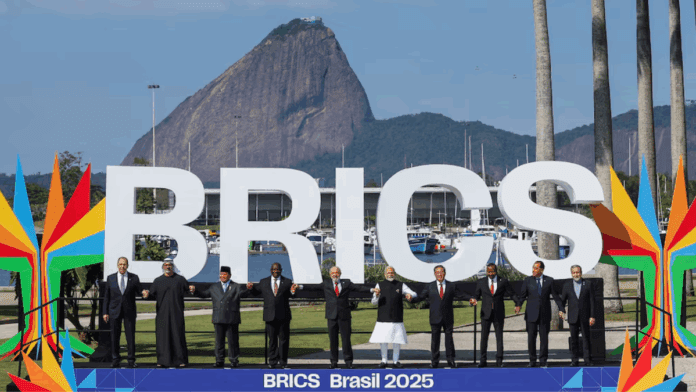U.S. President Donald Trump has announced that the United States will impose an additional 10% tariff on any country that aligns itself with the BRICS group. This comes as BRICS leaders gather for a major summit in Brazil.
Trump shared the announcement on his social media platform, stating, “Any Country aligning themselves with the Anti-American policies of BRICS will be charged an ADDITIONAL 10% Tariff. There will be no exceptions to this policy.”
The statement has caused concern among global leaders, especially as Trump did not clearly explain what he meant by “Anti-American policies.” His warning came just hours after BRICS leaders released a statement criticizing rising trade tariffs, including those imposed by the U.S.
The timing of Trump’s announcement appears aimed at disrupting the unity of BRICS, a group of major developing nations that includes Brazil, Russia, India, China, and South Africa. Recently, the group added more members including Egypt, Iran, Indonesia, Ethiopia, Saudi Arabia, and the UAE. This summit is the first to include Indonesia as a participant.
With more than 30 nations now interested in joining BRICS as either full members or partners, the U.S. decision may affect how countries approach future global alliances.
Lee Jae Myung warns of looming economic blow if U.S. tariff deal fails by July 8
BRICS Leaders Defend Global Trade, Push for Unity
As leaders met in Rio de Janeiro, Brazil’s president emphasized BRICS’ growing importance on the world stage. He described the group as a modern version of the old Non-Aligned Movement, which stayed neutral during the Cold War.
In a strong opening speech, the Brazilian leader said, “BRICS is the heir to the Non-Aligned Movement. With multilateralism under attack, our autonomy is in check once again.” He warned that protectionist policies and rising tariffs are threatening global trade.
The joint BRICS statement released on Sunday criticized the rise in tariffs, saying it could harm global trade. Although the statement didn’t mention the U.S. by name, the message was clearly aimed at Trump’s trade policies.
The statement also showed the group’s support for developing countries. It included concern for Palestinians under attack in Gaza and condemned violence in India-administered Kashmir. It also supported the peaceful use of nuclear facilities in Iran and urged the inclusion of Iran and Ethiopia in the World Trade Organization.
Despite the show of unity, not all BRICS members were present in person. China’s president sent his premier instead, and Russia’s president joined the summit online due to legal issues related to the Ukraine conflict. However, other key leaders, including the heads of India and South Africa, attended in person.
BRICS blasts Al exploitation by big tech—pay up or get regulated
BRICS Pushes Back Against U.S. Influence with Bold New Steps
This year’s BRICS summit is being seen as a signal of changing global power. Together, countries now make up over half of the world’s population and produce about 40% of the global economy. Leaders say this is proof that developing countries should have a bigger say in world affairs.
The BRICS statement called for updates to international institutions like the United Nations Security Council and the International Monetary Fund. According to Brazil’s president, the current system does not reflect today’s world and needs to be reformed.
One key area of progress discussed at the summit was the group’s New Development Bank. Leaders backed plans for a BRICS Multilateral Guarantees initiative. This would help lower the cost of financing big projects in member countries and increase investment.
There was also a call for strong rules on artificial intelligence. The leaders said AI must be used responsibly, with protections to stop unfair data use and ensure fair payment for services.
Brazil is also using this event to push its climate agenda ahead of a major UN climate meeting later this year. Brazil’s finance minister held talks with China and the UAE about funding a new program to protect endangered tropical forests.
While global attention focuses on trade wars and rising tensions, BRICS is aiming to show that large developing nations can work together and offer solutions. But Trump’s new tariff threat could create new obstacles in an already fragile global trade system.
